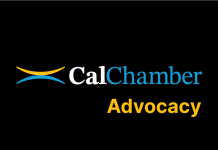 If California’s general election were held today, the majority of California voters would reject Proposition 30, according to the latest statewide survey conducted by the Public Policy Institute of California (PPIC).
If California’s general election were held today, the majority of California voters would reject Proposition 30, according to the latest statewide survey conducted by the Public Policy Institute of California (PPIC).
Proposition 30 is a November ballot measure that proposes to raise the tax on personal income above $2 million by 1.75% to subsidize zero-emission vehicles and charging stations. The California Chamber of Commerce and newspapers across California oppose the measure, citing concerns about California’s repeated reliance on a volatile funding system that taxes high-income earners to fund state programs, among many other reasons to vote no on Prop. 30 on November 8.
PPIC Survey Results
According to the PPIC’s survey, only 41% of likely voters would vote “yes” on Proposition 30, with 52% of respondents voting “no.” Seven percent of likely voters are still unsure of how they would vote.
The survey also found that partisan opinions are divided on the ballot measure, with 61% of Democrats voting “yes,” compared to 15% of Republications and 38% of Independents. Across regions, and among men and women, support falls short of a majority, with 36% of men and 45% of women voting “yes.”
Fewer than half of likely voters across racial/ethnic groups say they would vote “yes,” with 39% of whites, 42% of Latinos, 46% of other racial/ethnic groups voting in support of the measure.
Finally, just over half of likely voters with incomes under $40,000 (52%) would vote “yes,” compared to fewer in higher-income groups. For voters with an income between $40,000 to $79,999, support stands at 42%, with support falling to 36% for likely voters with an income of $80,000 or more.
Why Voters Should Vote ‘No’ on Prop. 30
Proposition 30’s income tax increase would raise about $3 billion to $4.5 billion a year (depending on the state of the economy), and end on January 1, 2043, or, beginning in 2030 following three consecutive years in which greenhouse gas emissions were at least 80% below 1990 levels.
California has the highest personal income tax rate in the country at 13.3%, while Alaska, Florida, Nevada, South Dakota, Texas, Washington and Wyoming do not impose any income tax. In 2019, the top 8% of income taxpayers paid 75% of the state’s personal income tax (PIT) revenue. In the 2022 budget year, PIT revenue will account for nearly two-thirds of all state General Fund revenues.
The CalChamber opposes Proposition 30 because layering more taxes on top of the current PIT rate of 13.3% will inevitably drive more high earners out of the state and decrease General Fund dollars.
“Given the state’s current ability to spend on nearly any desired cause, tax increases are unnecessary, and efforts should be focused on how existing General Fund dollars can be spent on assisting Californians,” CalChamber President and CEO Jennifer Barrera said.


